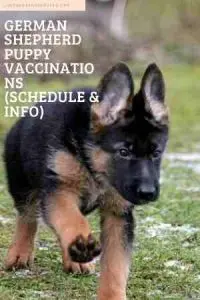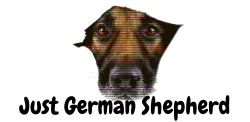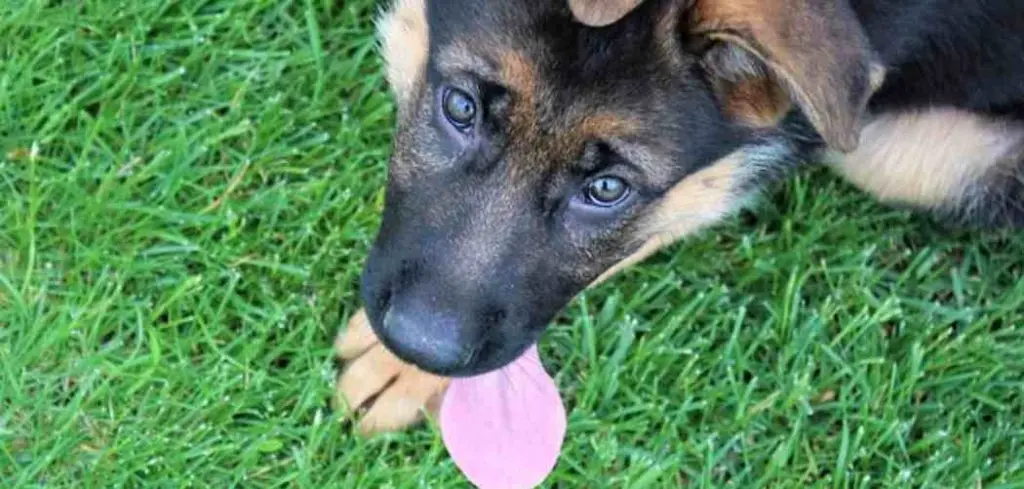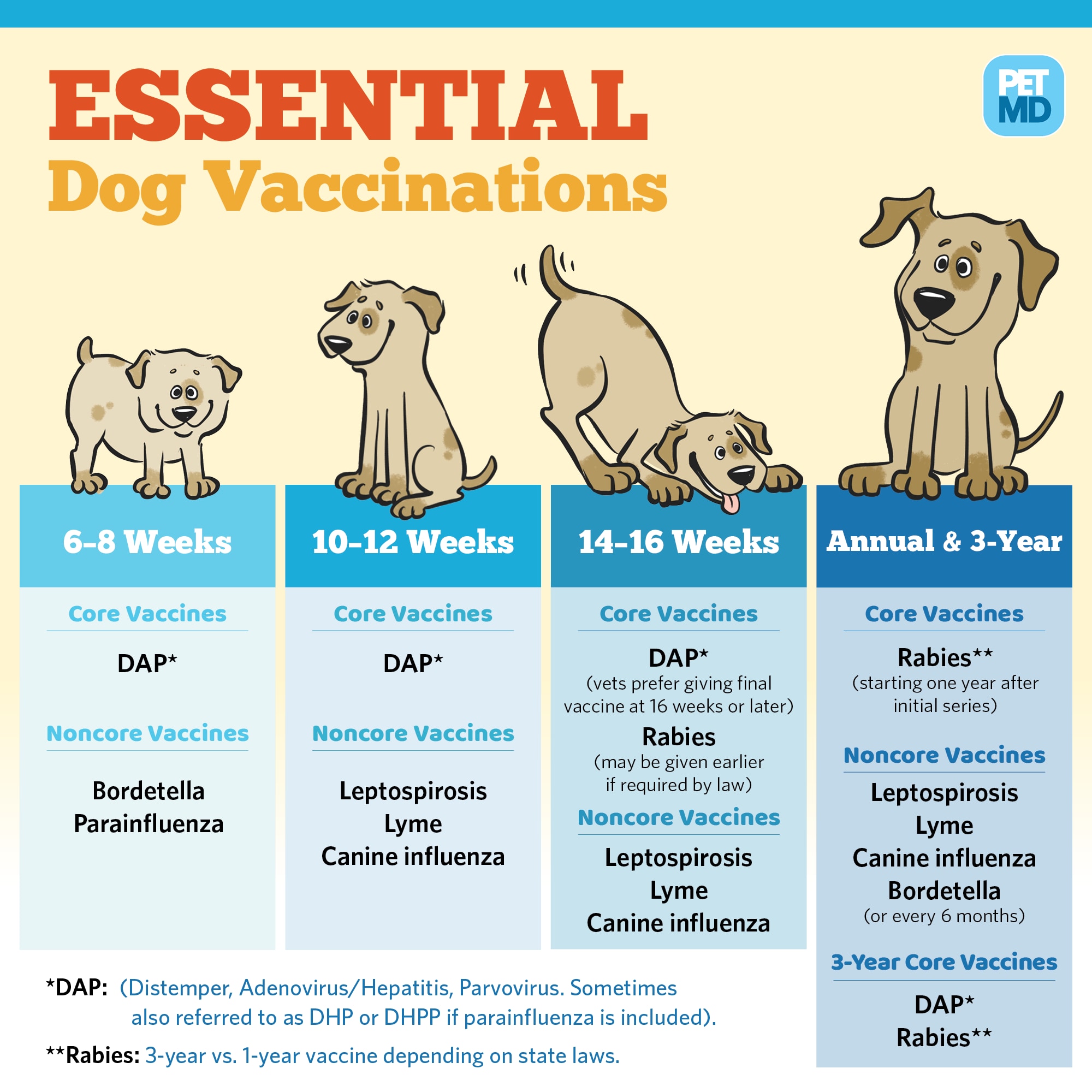
Your German Shepherd should have their vaccinations at 6 weeks, 8 weeks, 12 weeks and 16 weeks of age, these 4 shots protect them against Distemper, Hepatitis, Parainfluenza and Rabies.
For these first few months it may feel like you are in a revolving door back to the vets but these German Shepherd Puppy Vaccinations are critical to their health. Let’s take a look into these in more detail.
Table of Contents
German Shepherd Puppy Vaccination Schedule
What do the Core Shots Protect Against?
Canine Distemper
Canine Distemper is a virus that used to wipe out entire regions of dogs. It is a potentially fatal virus similar to measles in humans. Incredibly contagious the virus attacks the respiratory, gastrointestinal, and nervous system of dogs through the sneeze or cough of an infected animal. The virus can also be transmitted through food or water bowls.
Initial symptoms of the virus are:
- Mucousy eye and nose discharge
- Lack of appetite
- Coughing
- Pneumonia
- Fever (although this can come and go and is hard to detect)
As the infections spread symptoms include:
- Vomiting
- Diarrhoea
- Thickened paw pads (which is why one of the old names for the virus is hard pad disease)
If left untreated 1-3 weeks later the symptons will increase to:
- Seizures
- Twitching
- Weakness
- Stiffness
Canine Hepatitis
Canine Hepatitis is an incredibly contagious virus that is potentially fatal and affects the liver, kidney, spleen, lungs and eyes of affected dogs. The virus is spread through blood, nasal discharge, saliva, urine and faeces of infected dogs.
A puppy or dog with infectious canine hepatitis will show a variety of different symptoms. including:
- Fever
- Lethargy
- Diarrhoea
- Vomiting
- An enlarged liver
- Abdominal pain
A puppy or dog with a severe case of canine hepatitis may also have the following symptoms:
- Bruising of the skin
- Red dots on the skin
- Swollen and enlarged lymph nodes
Parvovirus
Parvovirus or Parvo is a highly contagious virus that is spread through direct contact with an infected dog or through contact with a contaminated object. Puppies are exposed to Parvo every time they lick or sniff feces. Indirect transmission can also occur through human contact.
The most common symptoms of Parvovirus are:
- Severe, bloody diarrhea
- Lethargy
- Anorexia
- Fever
- Vomiting
- Weight loss
- Weakness
- Depression
- Dehydration
Parainfluenza
Canine parainfluenza is a respiratory virus that can cause kennel cough in dogs. It’s a highly contagious virus and is passed between dogs that are in close contact of each other and transmitted through either direct contact, coughing, or bowls and bedding.
Symptoms Include:
- A dry, hacking cough
- Fever and high temperature
- A runny nose
- Sneezing
- Eye inflammation
- Depression
- lethargy
- Loss of appetite
Rabies
Rabies is a virus that effects the brain and spinal cord of mammals. Rabies causes the deaths of around 50,000 humans and millions of animals every year. Generally once symptoms appear the result is fatality. Rabies is passed through the bite or saliva of an infected animal. The most common carriers of Rabies in the United States are bats, raccoons, skunks and foxes.
If your puppy has rabies it is likely to have the following symptoms
- Behavioral Changes (Including restlessness, apprehension)
- Fever
- Aggression
As the virus progresses the infected puppy will also show the following symptoms
- Hypersensitivity (To light and sound)
- Paralysis of the throat and jaw
- Loss of appetite
- Weakness
- Seizures
What Do Non-Core Shots Protect Against?
Bordetella Bronchiseptica
Bordetella is a bacteria that is commonly associated with respiratory disease in dogs. Bordetella is one of a number of different bacteria and viruses that can cause Kennel Cough. It is spread through direct contact (licking, nuzzling) or through the air (coughing or sneezing).
Symptoms include:
- Persistent couging
- Hacking
- Gagging
- Fever
- Lethargy
- Nasal discharge
Leptospirosis
Leptospirosis comes from bacteria that is transmitted by rodents. It is most common in wet environments and can be found in muddy areas. Dogs will often come into contact with Leptospirosis through swimming or drinking infected water.
Symptoms include
- Fever and illness
- Sore muscles and a reluctance to move
- Weakness
- Depression
- Loss of appetite
- Vomiting
- Diarrhoea
- Coughing
- Nasal discharge
Lyme
Lyme is transmitted through ticks of an affected animal it is a bacterial illness that is caused by a spiral-shaped bacterium that gets into a puppy’s bloodstream.
Lyme disease is, unfortunately, a fairly common canine disease. Typical symptoms in dogs include:
- Fever
- Loss of appetite
- Reduced energy
- Lameness (can be shifting, intermittent, and recurring)
- Generalized stiffness, discomfort, or pain
- Swelling of joints
How much do vaccinations cost?
The cost of your German Shepherd Puppy’s vaccinations depend on where you live unfortunately. Vets with less competition will often increase their prices whereas vets in high competition areas will be as competitive as possible in the hope they get you and your puppy as a permanent customer.
The average cost for the full set of vaccinations will be around $100. The rabies vaccination is usually extra and around $20.
Vaccinations are absolutely critical for the long term health of your German Shepherd Puppy and help to shield them from a lot of potentially fatal viruses. Anybody that looks to take on a new puppy should always factor in the costs of shots when looking to add a furry friend to their family.
We hope this article helps and we would absolutely love to hear your thoughts in the comments.
If we missed some important information out of the post or you’d like anything added? Please let us know.



One thought on “German Shepherd Puppy Vaccinations (Schedule & Info)”
Yea , I have five new German Shepard puppies and my plans are to give them their first three rounds before finding them their new homes. I think it’s a good jump start for them. And it will be around Christmas time. They’ll be at that age where their not only playful but also learning. I think that’s good for the puppies as well as the new family.